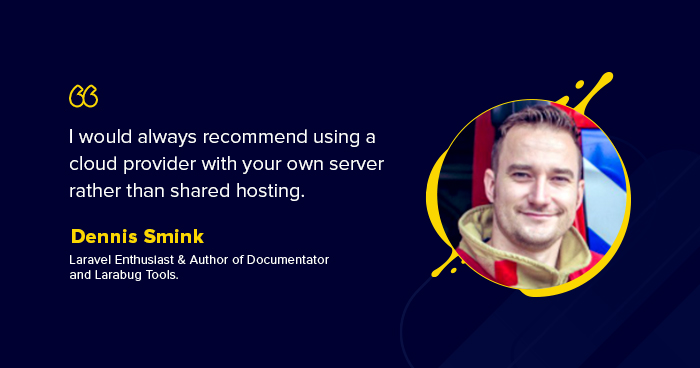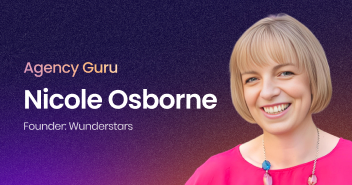
Dennis Smink is a freelance developer from the Netherlands, who often writes about Laravel & SaaS. With an experience of almost 3 years in the community, Dennis has been a great influence and a role model for many upcoming Laravel developers.
Shahzeb: Hello Dennis, thank you for taking the time out for this interview. Before we start, can you just tell us a little about yourself so our readers can get to know you better?
Dennis: Yes, certainly! My name is Dennis Smink. I’m 31 years old and living in the Netherlands with my wife and 2 month old son. I am a full time freelancer in website/app development, and a volunteer firefighter!
Shahzeb: Can you share your journey with Laravel? Any relatable experience from your career you find interesting and would like to share with our audience?
Dennis: I discovered Laravel back in 2014 while working a different job. I can remember version 5 was just released. My old company decided to go full-in with Laravel, and I came along. Coming from developing vanilla PHP apps & WordPress websites, Laravel was a breath of fresh air, although there was a learning curve.
Shahzeb: What were the major challenges you faced at the beginning of your career, and how did you tackle those?
Dennis: I think the biggest challenge I encountered was working together with a team of programmers and their opinions. Every developer had a certain preference on how to develop some specific piece of code and I’ve seen this cause conflict between co-workers. Never did this escalate, but it did put up some unnecessary discussions.
Shahzeb: You’ve built quite a few impressive PHP tools like Documentator and Larabug. How did you come up with such ideas?
Dennis: Documentator was a result of scratching my own itch, basically. I needed a good way to create documentation for the API for ploi.io and thought I would just create the tool myself so I could also document other tools. I know there’s a lot of other open source tools and paid solutions but I always found those over-engineered & complicated. I just needed something basic that works.
Larabug is another story! I started that project back in 2016 and focussed completely on the Laravel exception tracking. This idea came to me after I saw a package that collected PHP exceptions and reported them to your email that you could configure in a config file. That got me thinking: “Why not just report them to an API that collects the data and represents it to the user?”
And so I did. Just recently we actually went full-open source so others can contribute as well, and they are! The project is growing every month and it is great to see a lot of users track their exceptions properly.
Shahzeb: What made you think about developing Larabug?
Dennis: I thought of that after seeing a package that collected PHP exceptions and reported them to your email that you could configure in a config file. That got me thinking: “Why not just report them to an API that collects the data and represents it to the user?” And so I did. Just recently we actually went full-open source so others can contribute as well, and they are! The project is growing every month and it is great to see a lot of users tracking their exceptions properly.
Shahzeb: What challenges did you experience while developing Larabug?
Dennis: The biggest challenge was when Larabug started growing and the API requests started coming in. Because obviously, the more the users and projects, the more API calls I would receive. I would have to be able to handle all those requests, which meant upscaling the workers for PHP FPM, and processing the exceptions in a queue to make the FPM request as short as possible.
Shahzeb: What do you think are the main benefits developers take away from Documentator and Larabug tools?
Dennis: Tansparency, especially for Larabug. It’s completely open source and you’re free to host it for yourself (although that would be a burden). I consider this as a huge benefit as you can completely see what code is present on larabug.com & the package you install in your project.
Documentator has one main benefit in my opinion: simplicity. It’s not a product that has a lot of features and that’s what makes it powerful.
Shahzeb: You have extensive Laravel development knowledge. What motivated you to become a Laravel web developer? Who were your mentors and inspirations in this journey?
Dennis: As I said, my old job started using Laravel and I just went along with it actually. I didn’t really have any experience with Frameworks (except a small portion of Yii). Besides that, since the company was new to Laravel, we were our own mentors and colleagues. Which made the team much closer as well, as we all had to learn a new framework together.
Shahzeb: What tools do you use during Laravel development? What is your workflow?
Dennis: I use the following tools:
- PhpStorm
- GIT Tower
- TablePlus
- HELO (mail trapping)
- iTerm
- Laravel Valet
The basic workflow I use when I create a new app, for instance, goes something like this:
- Develop the application or feature in PhpStorm
- Manually check for N+1 queries
- Write tests
- Run tests
- If tests OK, push to GIT
- Deploy
Shahzeb: Which type of web hosting would you prefer? In your opinion, what are the benefits of hosting a site on a managed solution provider rather than conventional shared hosting?
Dennis: I would always recommend using a cloud provider with your own server rather than shared hosting. That’s because shared hosting comes with several limits, like restricted PHP extensions availability and no SSH access. These are all things you do want to have when developing your application. Of course, for your generic WordPress installation shared hosting could be fine.
A cloud provider with your own server gives you way more control for your application and such.
Shahzeb: What do you think about managed hosting solutions like Cloudways that provide an optimized PHP stack with features to deploy their web apps?
Dennis: They are great! I am running my own SaaS in server management and I can only recommend it. These tools always give you a great head start when it comes to setting up your own server.
Shahzeb: As a professional firefighter working as a full time developer, how do you maintain a work-life balance?
Dennis: I live day by day. I don’t plan far ahead (except dentist appointments, for example). If I notice there’s a specific subject in my life that needs more attention, I will focus more on that and just float my boat. I don’t have a strict mindset on how my work-life balance should be. As long as I feel good, my family feels good and my customers feel good: it’s all good!
Shahzeb: Who should we interview next and why?
Dennis: I can recommend Mike Slaats from UpVoty. He’s running a nice SaaS community and just recently he started vlogging on Youtube about his life and work.
Shahzeb: Dennis, I’m sure many people have taken notes. I’m also sure they’d love to see a picture of your workstation if you’d like to share one!
Dennis: Sure, here you go!

Shahzeb: Thank you once again, Dennis!
Dennis: You’re welcome Shahzeb, and thank you too!
Shahzeb Ahmed
Shahzeb is a Digital Marketer with a Software Engineering background, works as a Community Manager — PHP Community at Cloudways. He is growth ambitious and aims to learn & share information about PHP & Laravel Development through practice and experimentation. He loves to travel and explore new ideas whenever he finds time. Get in touch with him at [email protected]


